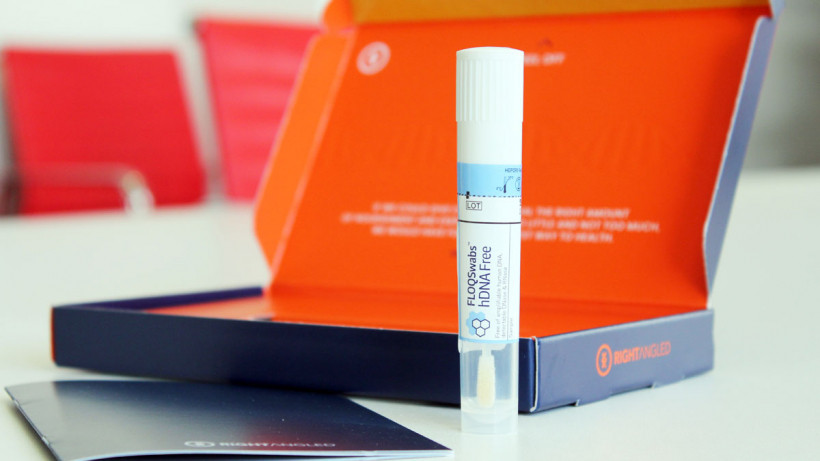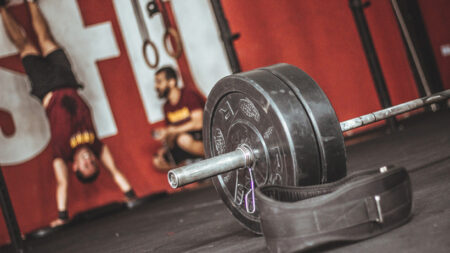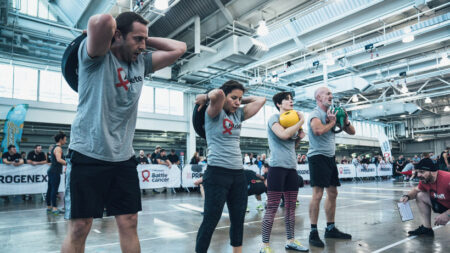The story behind one of the fitness industry's biggest new trends
It’s one of the biggest trends in health and fitness at the moment, but is DNA testing really the silver bullet to understanding how we should train or is it just another exciting buzz-phrase?
With fitness growing more popular than ever before, so are products that take a deep dive into our abilities. From advanced technical gait analysis for running shoes and wearable tech that reports on everything from heart rate to vertical oscillation, we have a range of tools that help us fine-tune our training.
The ultimate of these, though, might be the tool that doesn’t require us to purchase external goods to succeed, but rather helps us make the most of our genetic physiology – the DNA fitness test.
It’s no secret that genetics can play a huge part in athletic performance – just look at Michael Phelps’ long arm span and hypermobile ankles, which make him perfectly suited to swimming, or Dean Karnazes’ ability to clear lactic acid from his body to help him run ultra distances.
While most of us may not exhibit anything quite that extreme, there are certainly genetic factors that impact our fitness.
Using a lab test, companies such as Fitness Genes and Rightangled claim to analyse key genetic indicators around fitness, health and nutrition to create personalised diet and fitness plans. But what’s the science behind these tests, what do they tell you and – most importantly – are they worth the cost?
How does it work? What’s the science behind it?
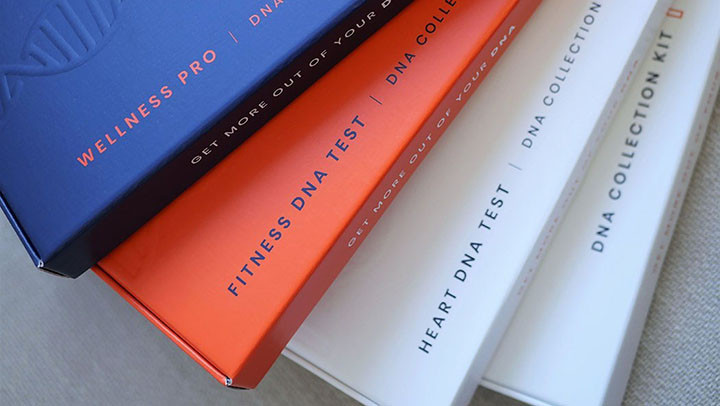
Your DNA is everywhere, so DNA tests can be done using strands of hair, skin cells, blood and more. For the purpose of most fitness DNA tests, they use saliva samples – these carry all the genetic info they need and are relatively unintrusive. Once you’ve sent these to the lab, they’ll extract the DNA and multiply it (sounds like they’re cloning you, but don’t worry, they’re not) so they have enough to test before processing it through a genotyping system.
The genes that are tested for vary from brand to brand. Companies like 23andMe and Ancestry tend to focus around reporting your genealogy (the genes from your family history and ethnicity) with options to add on health testing, whereas fitness-specific brands like DNAfit and FitnessGenes test more for genetic factors relating to muscle composition, food intolerances and ingredient sensitivities.
What are the choices?
The number of DNA testing options on the market keeps on growing. Here are a few tried and tested options.
DNAfit
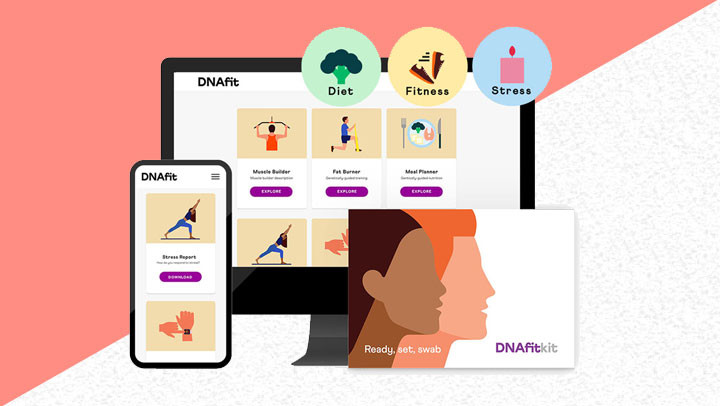
What is it? Launched in 2013, DNAfit offers three products depending on what you’re looking to find out – Diet Fit, Body Fit and Health Fit. At £129, Diet Fit is the cheapest, offering insights such as your ideal diet type, food sensitivities and personalised meal plans based on your data.
Body Fit provides the same, plus fitness details such as your aerobic capability and injury risk, as well as personal health coaching, for £149. At the top of the range is Health Fit for £165, featuring all of the above plus insights about your sleep habits and response to stress.
If you’ve previously used 23andMe or AncestryDNA, you can upload your results to DNA Fit’s Diet Fitness Pro 360 for £119 and you’ll get fitness and nutrition reports plus meal and training plans.
How does it work? You’ll be sent a kit including a saliva mouth swab kit – simply complete it and send it off.
How long? This one’s very speedy – you’ll get your results in 10 working days.
FitnessGenes
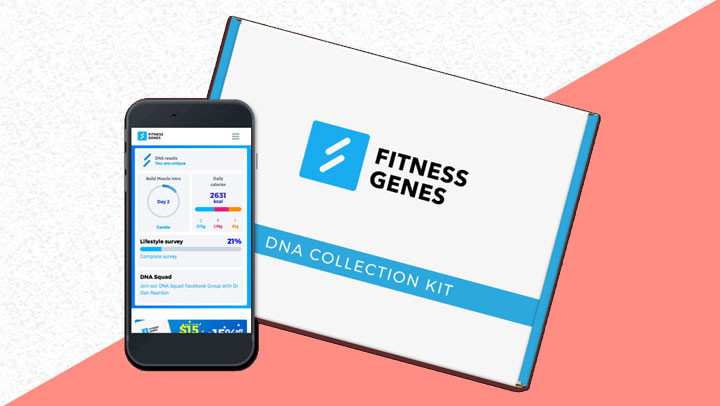
What is it? The brainchild of two genetic scientists (both with PhDs), a nutritionist and a doctor who’s also a qualified PT, it’s easy to see why FitnessGenes provides a comprehensive analysis of genes linked to sports performance and nutrition.
Their DNA analysis kit costs £129 and will provide you with an easy-to-read summary report, 31 personal insights including your muscle fibre profile (fast or slow-twitch) and how quickly you clear lactate, a nutrition guide and a one-week workout plan based on your results.
Additionally, 23andMe and AncestryDNA users can upload their details and get the same content for £39.
How does it work? A saliva cheek swab, which you mail off in the box it arrives in.
How long? FitnessGenes send your results back in two to three weeks.
Rightangled
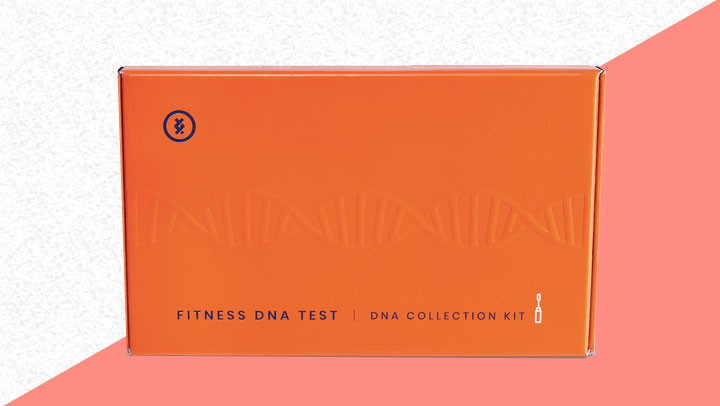
What is it? Rightangled is the only DNA test on the market with backing from NHS England, and carries out all testing in an ISO accredited lab. Their Fitness DNA test costs £129 and comes with eight-week diet and exercise plans, using your genetics to advise on how to boost your muscle growth, lose body fat and manage blood sugar levels. Particularly interesting factors they test for are your muscle recovery ability and Achilles tendinopathy risk.
In addition to this, Rightangled offer a range of more health-focused tests. These include the Heart DNA test (£129) which identifies issues that affect your cardiovascular health, such as your risk of atrial fibrillation and myocardial infarction. Wellness Pro (£169) combines the Fitness and Heart DNA tests to provide tailored info around weight management, your response to exercise and general diet, health and nutrition, while the Intolerance test (£79) is aimed at discovering your predisposed diet metabolism and nutrition requirements, including lactose and alcohol intolerances, dietary interactions, eating behaviour, sugar conversion, sensitivity and more.
How does it work? This is a two-parter – you’ll need to send off a cheek swab, plus fill out a detailed questionnaire.
How long? Your results will be back with you within five weeks.
VITL
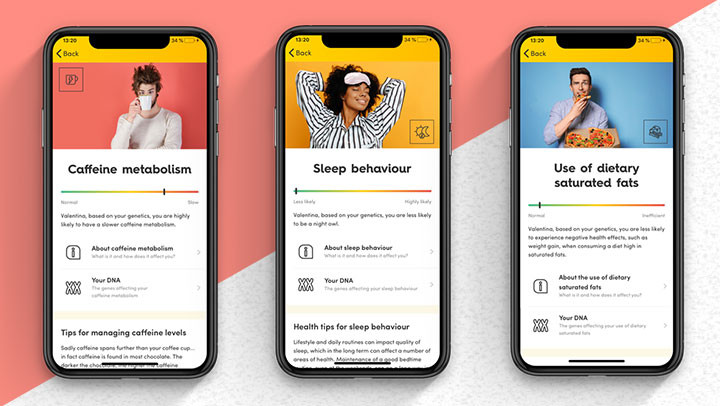
What is it? VITL’s DNA test (£119) leans a bit more towards lifestyle than fitness, and makes a good option for anyone who gets overwhelmed by too much of a deep dive. They look into factors like your fat vs muscle composition, glycolic capacity in strength training, sleep behaviour, metabolic rate and how likely you are to develop grey hairs at an early age.
Another interesting product VITL offers is personalised multivitamins, which are tailored to suit your fitness goals and lifestyle needs (£14.95 per month).
How does it work? A simple cheek saliva swab.
How long? VITL will send your results in 10 working days.
How much of your fitness level is determined by DNA?
While DNA plays an essential part in how your body works, and thus how you perform in your sport or activity of choice, there’s no denying environmental factors play a major role too. A 2013 research review into the genetics of young athletes found that having genes on an athlete’s side for their sport (those related with either power or endurance), along with an “optimal training environment” was key for elite performance, but there were few specific genes linked strongly enough to foresee athletic success.
“Genes certainly are important, such as influencing the ratio between fast and slow-twitch muscle fibres,” says Dr Andy Kirkland, an endurance coach and lecturer in Sport at the University of Stirling. “However, by the time athletes get to 18 years old, I can pretty much tell from their performance where their natural talents lie without the need for testing kits.”
So, while a fitness DNA test can tell you some interesting facts about your genome, it’s not necessarily a life-changer in terms of how you train and what you’re good at. (And sadly, it means we can’t totally blame our inability to sprint fast/do a 100kg deadlift/do the splits on our DNA.)
Does fitness DNA testing make a real difference?

DNA testing for fitness can provide some fun facts, but with nature vs. nurture coming into play, it’s sometimes hard to tell how helpful they are.
Georgina Spenceley, a CrossFitter and marathon runner, has tried both DNAfit and FitnessGenes tests. “Taking two tests, I was lucky to be able to compare the results and see that they were both accurate.
“Most interesting was finding out that I have the “fat gene” which causes increased hunger and a loss of control around food, but I also have a fast (but inefficient) metabolism, meaning I burn more calories but lose the energy as heat. This has helped explain why I’m always really warm, especially around meal times.
“From a training perspective, I learnt that I recover quickly, process caffeine quickly, and am likely to respond to creatine (which around one third of the population don’t). I’m also likely to have an even split of fast and slow-twitch muscle fibres. These points have helped me understand my training potential and mean I can train and supplement more effectively. I wouldn’t say many points surprised me, but they helped me to identify better with my body and how it responds to training.”
Taking two tests, I was lucky to be able to compare the results and see that they were both accurate
One potential issue with fitness DNA testing companies is how they translate results into action plans. While it’s a helpful bonus to receive a training plan based on your muscle fibre profile and lactate response, this information sometimes become convoluted as the brands mass produce advice based on certain factors.
For example, one DNA test website told a user in one section that their ideal exercise tempo was slow (2,020-3,020 ratio) with a high rep range, high number of sets and 45-60 second rest periods, but recommended HIIT with short rest periods and a 1:1 work to rest ratio elsewhere.
Summary
If you’re into in-depth data, want to explore your genetics and have the budget, DNA fitness testing can be a fascinating insight into how your body works – and if you opt for a health-focused test such as Rightangled, you’ll receive useful medical info too.
However, the true impact DNA has on your fitness is difficult to tell – if you’ve grown up running cross-country then moved successfully into marathons, it’s possible you could still be the proud owner of two fast-twitch muscle genes usually associated with sprinting.
That’s not to say that the science and technology behind it won’t develop over the coming months and years, but at the moment the benefits of DNA testing for fitness are unclear. There is, without doubt, a lot of information there, but the jury is still out on the application of mass produced genetic testing.


